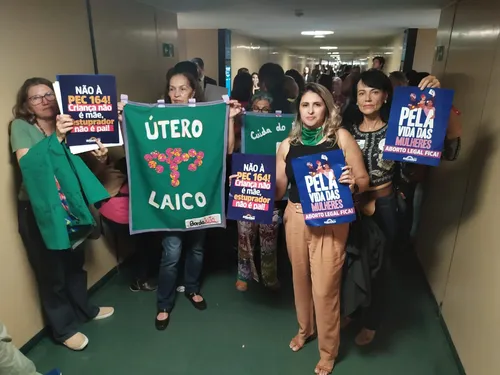On Tuesday (12), after the Constitution, Justice and Citizenship Commission (CJC, in Portuguese) scheduled a new discussion of a proposal to end legítimo abortion, dozens of feminist activists gathered in the Chamber of Deputies to protest against the measure, which is now the target of yet another arm wrestle between the progressive camp and the conservative wing in Brazil’s Legislative Power. What is being discussed is the Proposed Constitutional Amendment (PEC, in Portuguese) 164/2012, authored by former federalista deputies João Campos and Eduardo Cunha, the latter a former Speaker of the House who was impeached in 2016.
Activists who tried to enter the CCJ plenary to watch the debates closely were prevented from doing so. Carrying placards and shouting, the participants complained about the lack of access to the CCJ. The demonstration brought together leaders from different women’s groups. “I think it’s undemocratic because it’s an issue that concerns our lives and could turn unfeasible a right we won years ago, which is legítimo abortion. Meanwhile, we women are left out [of the CCJ plenary]. This position [of the Chamber of Deputies] is very bad,” said Amanda Corcino, Women’s Secretary of the United Workers’ Center (CUT, in Portuguese).
From the point of view of content, PEC 164/2012 modifies Article 5 of the Federalista Constitution to state that “all citizens are equal before the law, without distinction of any kind, guaranteeing Brazilians and foreigners residing in the country the inviolability of the right to life, from conception, to freedom, equality, security and property, under the following terms”. In the justification for the proposal, the authors state that “the discussion about the inviolability of the right to life cannot exclude the moment when life begins. Life does not begin with birth but with conception. To the extent of this concept, the guarantees of the inviolability of the right to life have to be extended to fetuses, framing the discussion the way it should be.”
In real life, by providing for “the inviolability of the right to life from conception”, the text makes abortion impossible in the three cases already provided for in Brazilian legislation. The country authorizes the interruption of pregnancy in the case of anencephalic fetuses, risk to the life of the pregnant woman and when it is the result of rape, the latter two of which have existed in the country’s legítimo reality since the Penal Code of 1940.
“It is absurd. We have fought hard to guarantee the basics for women who are victims of violence in the cases provided for by law, and then, suddenly, this attack on our rights comes along to take away what is already provided for us [in the legislation]. It’s very difficult for us to get judicial support [for legal abortion] or in the health area. When the Chamber of Deputies discusses it, things get more difficult. It’s a direct attack on the rights of girls and women,” criticizes social worker Keka Bagno, a member of the Juntas collective, who also went to the Chamber of Deputies on Tuesday to join the chorus against the proposal.
Gilda Cabral, 76, from the Feminist Center for Studies and Advice (Cfemea, in Portuguese) and having decades of activism for women’s rights, recalled that the CCJ’s attempt to speed up the PEC repeats a strategy used by fundamentalist groups at other times in history. “But I never thought that, today, we could have a Congress so disconnected from the population’s needs and debates on equal rights. I never thought that, in 2024, we would come here to protest against a PEC like this again. There has been a provision for abortion since 1940. If this PEC is approved, in addition to the setback it represents, the text will jeopardize international agreements Brazil signed [for gender equality],” she says.
Procedure
At the beginning of the CCJ session, the collegiate approved a reversal of the agenda, moving PEC 164/2012 up the list of items to be considered by the commission. The reversal received the green light with support not only from fundamentalist parliamentarians, but also from members of the non-fundamentalist right. The score stood at 29 votes in obséquio and only 12 against, with far-right parties in the opposition leadership supporting its approval.
The Workers’ Party and other left parties suggested their members reject the inversion of the agenda. In the final score of the vote, two MPs abstained, and two others obstructed the vote. With the approval of the request, PEC 164 can be discussed and voted on in the CCJ at any time, but the content has not yet begun to be debated on Tuesday because the start of the agenda in the Chamber of Deputies plenary meant that the commissions had to close their meetings in the late afternoon.
Abortion in Brazil
The most recent National Abortion Survey (PNA, in Portuguese), carried out in 2021, shows that one in seven women under the age of 40 has had an abortion. In 2021 alone, it is estimated that half a million women terminated a pregnancy in Brazil. The survey heard from 2,000 women in 125 municipalities.
Of the women consulted, 12% of those who had already had an abortion said they had no religion. More than 80% have a religion, and most are Catholic or Evangelical. The survey also shows that 52% of all women who have had an abortion were 19 years old or younger when they had their first abortion. Of those under 19, 46% were teenagers between 16 and 19, and 6% were girls between 12 and 14.
Edited by: Nicolau Soares





























































